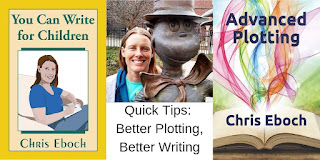January was #STORYSTORM with Tara Lazar. Formerly known as #PiBoIdMo, the challenge was to come up with one new story idea each day of the month. Maybe you met the challenge every day, or maybe you came up with fewer ideas. Either way, the next question is, "Now what?
Sometimes, a writer has a great premise, an intriguing starting point—but nothing more. How do you recognize when you have just a premise, and when you have the makings of a full story? And more importantly, how do you get from one stage to the other?
What is a story?
If you have a “great idea,” but can’t seem to go anywhere with it, you probably have a premise rather than a complete story plan. A story has four main parts: idea, complications, climax and resolution. You need all of them to make your story work.
The idea is the situation or premise. This should involve an interesting main character with a challenging problem or goal. Even this takes development. Maybe you have a great challenge, but aren’t sure why a character would have that goal. Or maybe your situation is interesting, but doesn’t actually involve a problem.
For example, I wanted to write about a brother and sister who travel with a ghost hunter TV show. The girl can see ghosts, but the boy can’t. That gave me the characters and the situation, but no problem or goal. Goals come from need or desire. What did they want that could sustain an entire series?
Tania feels sorry for the ghosts and wants to help them, while keeping her gift a secret from everyone but her brother. Jon wants to help and protect his sister, but sometimes feels overwhelmed by the responsibility.
Now we have two main characters with problems and goals. The story is off to a good start. (It became Haunted: The Ghost on the Stairs.)
Tip: Make sure your idea is specific and narrow, especially with short stories or articles. Focus on an individual person and situation, not a universal concept. For example, don’t try to write about “racism.” Instead, write about one character facing racism in a particular situation.
See the links to posts on developing ideas or conflict in the right-hand column for more help.
Learn more at www.chriseboch.com
or her Amazon page.
Sometimes, a writer has a great premise, an intriguing starting point—but nothing more. How do you recognize when you have just a premise, and when you have the makings of a full story? And more importantly, how do you get from one stage to the other?
What is a story?
If you have a “great idea,” but can’t seem to go anywhere with it, you probably have a premise rather than a complete story plan. A story has four main parts: idea, complications, climax and resolution. You need all of them to make your story work.
The idea is the situation or premise. This should involve an interesting main character with a challenging problem or goal. Even this takes development. Maybe you have a great challenge, but aren’t sure why a character would have that goal. Or maybe your situation is interesting, but doesn’t actually involve a problem.
For example, I wanted to write about a brother and sister who travel with a ghost hunter TV show. The girl can see ghosts, but the boy can’t. That gave me the characters and the situation, but no problem or goal. Goals come from need or desire. What did they want that could sustain an entire series?
Tania feels sorry for the ghosts and wants to help them, while keeping her gift a secret from everyone but her brother. Jon wants to help and protect his sister, but sometimes feels overwhelmed by the responsibility.
Now we have two main characters with problems and goals. The story is off to a good start. (It became Haunted: The Ghost on the Stairs.)
Tip: Make sure your idea is specific and narrow, especially with short stories or articles. Focus on an individual person and situation, not a universal concept. For example, don’t try to write about “racism.” Instead, write about one character facing racism in a particular situation.
See the links to posts on developing ideas or conflict in the right-hand column for more help.
Chris Eboch is the author of over 60 books for children,
including nonfiction and fiction, early reader through teen. Chris’s
novels for ages nine and up include The
Eyes of Pharaoh, a mystery in ancient Egypt; The Well of Sacrifice, a Mayan adventure; The Genie’s Gift, a middle eastern fantasy; and the Haunted series,
about kids who travel with a ghost hunter TV show, which starts with The Ghost on the Stairs.
Her writing craft books include You Can Write for Children: How to Write Great Stories, Articles, and Books for Kids and Teenagers, and Advanced Plotting.
Her writing craft books include You Can Write for Children: How to Write Great Stories, Articles, and Books for Kids and Teenagers, and Advanced Plotting.




No comments:
Post a Comment